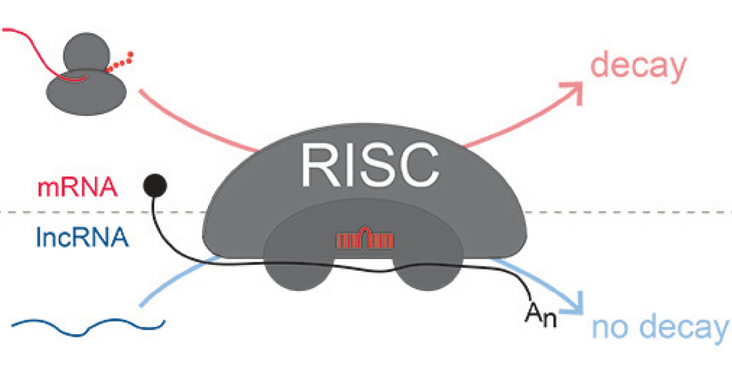The labs of Ana Claudia Marques and Constance Ciaudo investigated the requirement of translation for miRNA mediated RNA decay. Their paper entitled "Translation is required for miRNA-dependent decay of endogenous transcripts" has been published in EMBO Reports.
Synopsis
Evidence that miRNA-dependent transcript decay occurs co-translationally raises questions regarding the requirement of translation in this process. Analysis of cytosolic long noncoding RNAs (lncRNAs) reveals that coding and non-coding transcripts are differentially susceptible to repression by miRNA-dependent decay.
- miRNAs interact with both coding and noncoding transcripts in mESCs
- In contrast to coding transcripts, steady-state abundance and decay rates of cytosolic
- lncRNAs are insensitive to miRNA loss. lncRNAs fused to protein?coding reporter sequences become susceptible to miRNA-mediated decay
- Natural miRNA-sensitive lncRNAs associate with translating ribosome and likely code for micropeptides
Abstract
Post-transcriptional repression of gene expression by miRNAs occurs through transcript destabilization or translation inhibition. mRNA decay is known to account for most miRNA-dependent repression. However, because transcript decay occurs co-translationally, whether target translation is a requirement for miRNA-dependent transcript destabilization remains unknown. To decouple these two molecular processes, we used cytosolic long noncoding RNAs (lncRNAs) as models for endogenous transcripts that are not translated. We show that, despite interacting with the miRNA-loaded RNA-induced silencing complex, the steady-state abundance and decay rates of these transcripts are minimally affected by miRNA loss. To further validate the apparent requirement of translation for miRNA-dependent decay, we fused two lncRNA candidates to the 3'-end of a protein-coding gene reporter and found this results in their miRNA-dependent destabilization. Further analysis revealed that the few natural lncRNAs whose levels are regulated by miRNAs in mESCs tend to associate with translating ribosomes, and possibly represent misannotated micropeptides, further substantiating the necessity of target translation for miRNA-dependent transcript decay. In summary, our analyses suggest that translation is required for miRNA-dependent transcript destabilization, and demonstrate that the levels of coding and noncoding transcripts are differently affected by miRNAs.
Read the Publication in EMBO Reports (Open Access)
Abstract, figure and synopsis from Biasini et al. (2020) EMBO Reports published under the CC BY 4.0 license.
